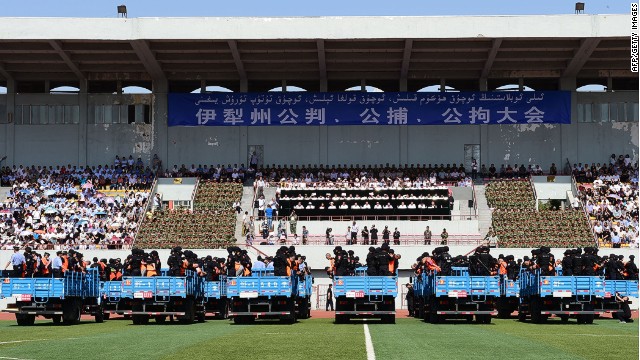By Hojin Choi
Impunity Watch Reporter, Asia
XINJIANG, China – A Chinese court sentenced 55 people for terrorism, separatism, and murder at a sports stadium. The sentence was handed down before a crowd of more than 7,000 spectators in the prefecture of Yili, a part of Xinjiang Uyghur Autonomous Region. Three of the defendants were sentenced to death.

The open trial follows a spike in widespread fear of terror attacks and increasing tensions across the country. In October, five people were killed and at least 40 injured by a car rushing into crowds of innocents on busy streets in Beijing. In March, a group of men armed with long knives invaded a train station in the city of Kunming and murdered 29 people, and injured at least 130 others at the scene. In early May, some 39 people were killed and almost 100 injured by a terror bombing in Xinjiang.
Chinese authorities believe these terror attacks were carried out by a separatist group formed with Uyghurs, an ethnically Turkic Muslim minority group native to the Xinjiang region. The ruling Communist Party declared an anti-terrorism campaign to strike hard any “violent terrorism, separatism, and religious extremism.” Li Minghui, Deputy Party Secretary of the prefecture of Yili, said they must “resolutely strike criminals … and boost the confidence and will to fight for all ethnicities among the masses.” The Xinjiang police launched a crackdown on the extremist groups that has resulted in 200 arrests of suspected terrorists so far.
Uyghurs have complained for a long time about pervasive discrimination in favor of Han, the Chinese majority ethnic group. The alleged discrimination includes employment, education, housing, and religious freedom restrictions. The Chinese government believes that Uyghurs are trying to form an independent state called East Turkestan.
Human rights organization Amnesty International described the “deplorable” proceeding as a “show trial.” William Nee, China Researcher of Amnesty International, said the recent terror attacks and disregard of human lives must be held to account. However, “speedy show trials will not deliver justice for the victims. Hastily sentencing people after unfair trials will only exacerbate tensions in the region,” said Mr. Nee.
The regional Communist Party leader announced before trial that the suspected criminals should be “severely punished.” According to Amnesty International, this places all of the defendants at risk of torture while they are detained.
According to Reuters, the trial was originally reported by the official Xinhua news, a state-operated press agency, but links to the news appear to be disconnected at this time.
For more information please see:
Reuters – China sentences 55 in Xinjiang mass trial – 28 May 2014
CNN – 55 sentenced before 7,000 onlookers at terror ‘show trial’ in Chinese stadium – 29 May 2014
CNN – China train station killings described as a terrorist attack – 2 March 2014
Aljazeera – China sentences 55 in mass stadium trial – 29 May 2014
BBC – China sentences 55 people in Xinjiang stadium – 28 May 2014
Amnesty International – China: Shameful stadium ‘show trial’ is not justice – 29 May 2014

